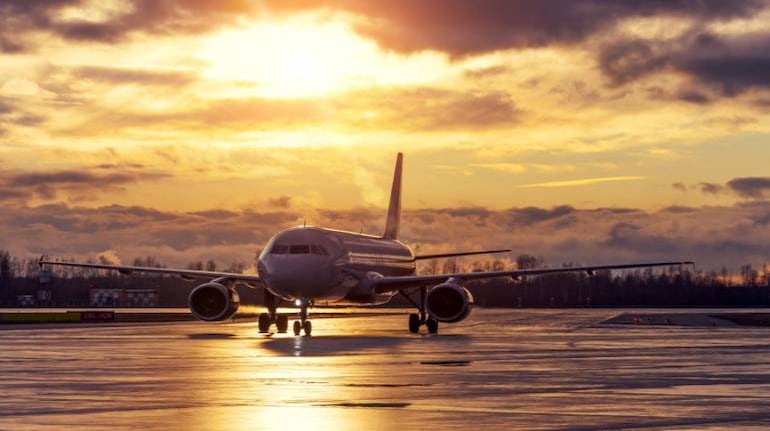
Asia woke up to the news of an assault on Ukraine by Russia. Official communication was hard to come by, but the hours leading up to the reports of the first blasts had seen reports of the IT network in Ukraine being compromised.
The world wouldn't have imagined another conflict so soon, after the hasty exit by Americans from Afghanistan and the subsequent takeover by the Taliban.
Even as news of the Ukraine conflict emerged, Air India pushed back its second of the three flights to Kyiv to bring back stranded Indians. The flight had to subsequently return over Iran and head back to New Delhi.
The first glimpse of a possible conflict came up in the wee hours in Ukraine and Russia, with the Russian side releasing a NOTAM (Notice to Airmen) for closure of all airspace in the disputed areas over Eastern Ukraine.
Catch all news updates around Russia-Ukraine here
This was followed by the announcement of closure of Dnipro, Kharkiv, Lyiv and Kyiv - some of the major cities of Ukraine. This was quickly topped up by the closure of the entire Ukrainian airspace with another NOTAM. While these NOTAMs came up, a couple of airlines were either headed towards Ukraine or overflying the country.
A few, like El-Al, changed course immediately, while those destined for airports in Kyiv diverted elsewhere.
Leading up to the possible conflict, lessors had already asked the aircraft flown by Ukrainian airlines to be sent out of the country. Yet, many aircraft continue to be at various airports within the country. The first few hours of the conflict have so far not seen any civilian aircraft being managed but conflict details are sketchy and hard to come by in real time, even in this age of social media.
Airlines avoiding Belarus as well
Since MH17 was lost over the conflict zone of Donbass in 2014, airlines have been avoiding Ukrainian airspace. Both Air India and Vistara, which fly to points in Europe, have been avoiding overflying Ukrainian airspace. However, that is not true for other airlines.
With airlines also avoiding the Belarusian airspace after the country forced-land one of the RyanAir flights and arrested opposition activists and journalists, the Ukraine conflict is turning out to be another thorn in the scheme of things.
While the impact of these actions will be felt largely by European carriers, the impact of war has meant that oil price has inched higher and higher.
Also read: Oil and gas stocks tumble as Brent hits $100 mark on Russia-Ukraine crisis; IGL, RIL, Petronet fall
High oil price, lower passengers due to the pandemic and a possible conflict or war is a triple whammy from which airlines will find it very difficult to come out quickly. For some, this could well be the last nail in the coffin.
What should you know if you are a passenger?
The most inconvenienced lot are the passengers of the two Air India flights who would have been waiting with bated breath in Ukraine to fly to India. One can only imagine the stress that a passenger with a booked ticket in hand would face, knowing that the airspace is now closed and sirens warning of air raids.
For flights to any other parts of the world, a lot depends on how the conflict shapes up from here. If the world powers or NATO join in, this has the potential to escalate beyond Ukraine, Europe and Russia.
If you are a passenger flying anywhere to Europe or to Russia, in particular, keep track of the situation on the ground and follow social media handles of concerned airlines and countries. The local Indian embassy and consulates have updated information and guidelines for Indians. These can help take an informed call without panic.
If the conflict escalates and airlines are forced to avoid Russian airspace, it could have an impact on the connectivity to North America as well. Until more details are known from a passenger perspective, it is wait and watch.
Airlines typically refund ticket value in case of a cancellation. But the stress during the pandemic has led to a lot of airlines putting the money in a credit shell or delaying refunds. If you are booking a high-value ticket, one may want to look at the history of the airline for refunds before choosing the airline.
What next?
An emergency session of the United Nations, appeal for peace and talks have had little effect thus far. The situation is evolving at a very fast pace and changing equally rapidly. A lot of reports have been unconfirmed as has been the case in any of the recent wars.
Military experts have been divided on the outcome and the reason for the war, but most agree that unless it escalates into something major, this phase will be a short one. But they are the same experts who had claimed that Afghan military is powerful enough to not let the Taliban make a comeback!
Discover the latest Business News, Sensex, and Nifty updates. Obtain Personal Finance insights, tax queries, and expert opinions on Moneycontrol or download the Moneycontrol App to stay updated!